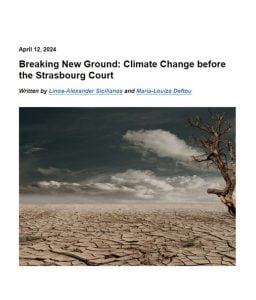The book at hand focuses on the international, European and national framework for the protection of forests adopting a multidisciplinary approach, as well as on keeping a record of the extent of the destruction in our country from the unprecedented forest fires of the summer of 2007 mainly, but also of 2009, the causes and consequences, but also the efforts to reduce the damage in the affected areas. The ultimate purpose of this work is to provide the reader with a tool that will contribute to the formation of his/her own assessments on the effectiveness of the general applicable legal framework for the protection of forests with regard to the specific phenomenon of forest fires in this case, but also the generative factors and the indicated methods of dealing with this terrifying form of ecological disaster.
This work is the result of a research undertaken by the Young Researchers’ Group of the Marangkopoulos Foundation for Human Rights (MFHR) and demonstrates how the combination of lack of organisation, political will and efficiency, often renders the mechanisms provided by the relevant legal framework inactive and reinforces any defects and gaps resulting in the destruction of a forest wealth of incredible value and beauty, such as the one lost in the devastating forest fires that the project explores. The Groups’ thorough research concludes in that the strengthening of all kinds of private interests over the public/common interest, which leads to a common inability to effectively deal with the phenomenon, highlights a critical fact, which is the basis that it feeds all other deficiencies: it is about the general indifference, or possibly contempt, for everything in common or, more generally, for everything that serves society as a whole. This is the most characteristic indication of a progressive breach of the social fabric, should concern the readership more than anything else.
The book analyses, at first, the international, European and national legal framework of forest protection, including the legally binding and non-binding instruments, fundamental mechanisms of the fight against climate change (REDD, Eleventh Conference of the Parties, Bali Action Plan, the Outcomes of Copenhagen, REDD Plus, Agreement for the period after 2012), those related to the action of international regional organisations (Council of Europe, Ministerial Conference on the Protection of Forests in Europe).
With regard to the European legal framework for the protection of forests, the Forestry Strategy of the European Union and the European Action Plan for Forests are analysed (Council Resolution of 15 December 1998 on a Forest Strategy for the European Union, European Action Plan for Forests, Green Paper for the protection of forests), the dimensions of forest protection in the context of the common agricultural policy and the European environmental policy, as well as Regulations 3528/1986 on the protection of forests in the Community from atmospheric pollution, 3529/1986 on the protection of forests in the Community from fires, 2158/1992 on the fire protection of Community forests, 2152/2003 on monitoring of forests and environmental interactions in the Community – “Focus on forests” and 614/2007 on the financial instrument for the environment (LIFE+). Finally, in the relevant chapter one may find information on the protection of forests in the context of the Natura 2000 network and the protection of forests in the context of Regulation 1698/2005 for the support of rural development by the European Agricultural Fund for Rural Development.
Furthermore, there is an analysis of the national legal framework for the protection of forests, including the protection of the forest environment on the basis of Public Law, the concept of forest and its application in the context of the administrative procedures of characterisation and reforestation, the means of protection of the forest environment are analysed at the level of prevention, suppression and restoration of the forest ecosystem and the protection of the forest environment according to Civil and Criminal Law, with particular reference to the crimes of arson of forest or forest area (art. 265-266 CC).
There is also a list of forest fires in Greece, in which part there is an analysis of the causes, consequences and efforts to restore the forest environment from the forest fires that took place in 2007 and 2009 in Arcadia, Attica, Achaia, Evia, Ilia, Corinthia, Laconia, Messinia, Thessaly, as well as in other areas of our country affected by fire during the abovementioned periods. The book is complemented by a separate narrative testimony, which clearly denotes the “Abandonment” of the martyred areas and concludes with the Resolution of the MFHR Young Researchers Group with proposals for dealing with the forest fires.
Publication Details
-
Date of publication:
2010
-
Publisher:
Athens: Nomiki Bibliothiki Group, 2010, 408 p. (in Greek)
-
ISBN:
9789602727409
-
Series:
Young Researchers’ Group MFHR Νο. 2



